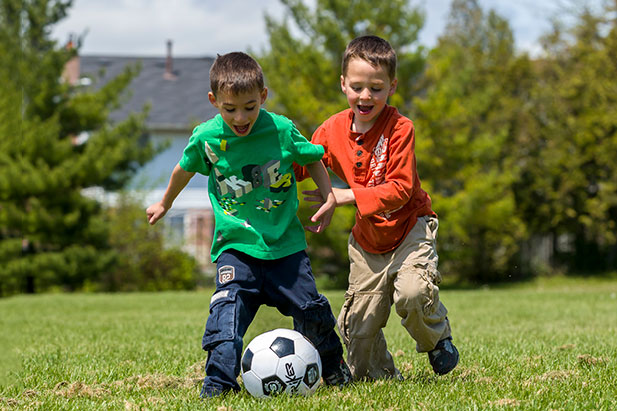Faculty of Health Sciences researchers: Moving the mind and the body
New study aimed at improving Canadians’ health and performance in sport and physical activity
February 28, 2017

Think Canadians are living an active, healthy lifestyle? Think again.
Studies indicate over 90 per cent of Canadians are physically inactive. Canadians with disabilities are even less active. Beyond the impact on the nation’s overall health, this inactivity drains an estimated $6.8 billion annually from the economy through personal, social and health implications. At the same time, many Canadians struggle to achieve their potential in sport.
With support from the Canadian Foundation for Innovation (CFI), research being led by Dr. Nick Wattie and Dr. Meghann Lloyd of the university’s Faculty of Health Sciences (FHS) will examine the scope of such challenges in the university’s Sport and Physical Activity Research Collaborative (SPARC) facility.
Funding for the research will come from the CFI’s John R. Evans Leaders Fund. The project is one of more than 200 at universities across Canada announced by the Honourable Kirsty Duncan, Minister of Science, during a visit to the University of New Brunswick in Fredericton.
- Link to federal CFI funding announcement (February 28, 2017).
“Many of us experience challenges and disappointments in the pursuit of living a physically active lifestyle, in rehabilitating from medical events, or in realizing our potential as athletes,” says Dr. Wattie, Assistant Professor, FHS, whose research collaborations include work with the Canadian Sport Institute of Ontario, Golf Canada, and Wheelchair Basketball Canada. “The spectrum of these movement challenges is vast, and at the centre of it all is understanding how people learn new movements.”
“Millions of Canadians are missing out on the bio-psycho-social benefits physical activity,” says Dr. Lloyd, Associate Professor, FHS, an international award-winning researcher in the field of adapted physical activity who has long-standing collaborations with Grandview Children’s Centre in Oshawa, Special Olympics Canada and Special Olympics International. “Managing and understanding movement-related challenges is an urgent problem for our country.”
Study objectives
- Studying movement skill acquisition across the spectrum of abilities and populations.
- Designing interventions to maximize skill acquisition in rehabilitation as well as talent development and performance in sport.
- Forging important connections with community and academic partners.
- Demonstrating the role of physical activity and sport as an essential component of physical and mental health, learning, cognitive functioning, and overall quality of life.
Research questions
- How can we structure learning environments and instruction to improve skill acquisition in high-performance athletes, as well as developing athletes?
- For children with developmental disabilities, what are the best intervention techniques for achievement of motor milestones, activities of daily living and sport skills?
- What are the most effective strategies to allow children with and without disabilities to play on the playground, facilitate social inclusion, and engage sport, recreation, and lifelong physical activity?
Quotes
"Investments in Canada’s research infrastructure, like those we are celebrating today, are incredibly important to our nation’s future. They help us to attract and retain the very best scientists and give Canadian researchers the tools they need to perform excellent cutting-edge research, train the scientists of tomorrow and enable innovative new discoveries that improve our environment, economy and communities.”
– The Honourable Kirsty Duncan, Minister of Science
“The Canada Foundation for Innovation’s John R. Evans Leaders Fund is integral to supporting Canada’s research efforts. This fund equips universities with state-of-the-art tools and facilities they need to draw in and keep the brightest minds. From preventing vision loss to developing renewable sources of energy, the recipients of this funding are working to the benefit of all Canadians.”
– Gilles Patry, President and CEO, Canada Foundation for Innovation
“Human health and community wellness is a priority area within the university’s strategic research plan. Thanks to Dr. Wattie’s and Dr. Lloyd’s successes working with community health organizations and a range of sport partners, this research has tremendous implications for improving Canadians’ quality of life.”
-Michael Owen, PhD, Vice-President, Research, Innovation and International, University of Ontario Institute of Technology
Related links
- @InnovationCA
- John R. Evans Leaders Fund
- CFI Research Facilities Navigator
- Meghann Lloyd, PhD, university Expert Centre profile
- Nick Wattie, PhD, university Expert Centre profile
- UOIT Faculty of Health Sciences Research website
- @UOIT
- @UOITResearch
About the Canada Foundation for Innovation
For 20 years, the CFI has been giving researchers the tools they need to think big and innovate. And a robust innovation system translates into jobs and new enterprises, better health, cleaner environments and, ultimately, vibrant communities. By investing in state-of-the-art facilities and equipment in Canada’s universities, colleges, research hospitals and non-profit research institutions, the CFI also helps to attract and retain the world’s top talent, to train the next generation of researchers and to support world-class research that strengthens the economy and improves the quality of life for all Canadians.
About the University of Ontario Institute of Technology
The University of Ontario Institute of Technology advances the discovery and application of knowledge through a technology-enriched learning environment and the delivery of innovative market-driven programs responsive to the needs of students and industry. With more than 10,000 undergraduate and graduate students enrolled in more than 75 programs, the university promotes social engagement, fosters critical thinking and integrates outcomes-based learning experiences inside and outside the classroom. The university’s commitment to accelerating economic growth and social innovation is realized through faculty research collaborations with leading organizations such as Ontario Power Generation, IBM, The Hospital for Sick Children (SickKids) and the Durham Regional Police Service. To find out more, please visit uoit.ca
Media contacts:
University of Ontario Institute of Technology
Communications and Marketing
905.721. 8668 ext. 6709
289.928.3653 (cell)
communications@ontariotechu.ca
Malorie Bertrand
Media Relations and Communications Officer
Canada Foundation for Innovation
613.943.2580 (office)
613.447.1723 (mobile)
malorie.bertrand@innovation.ca



